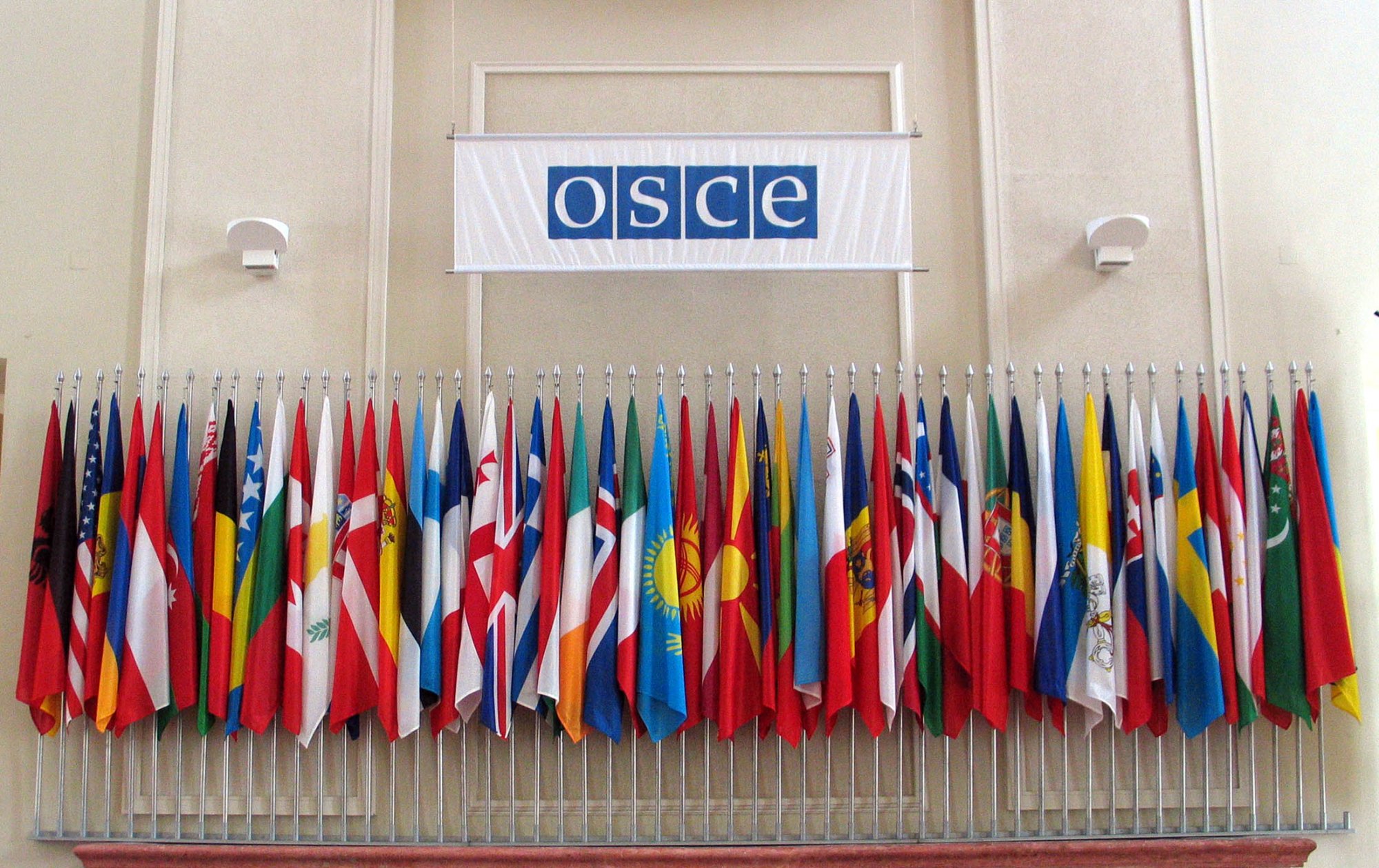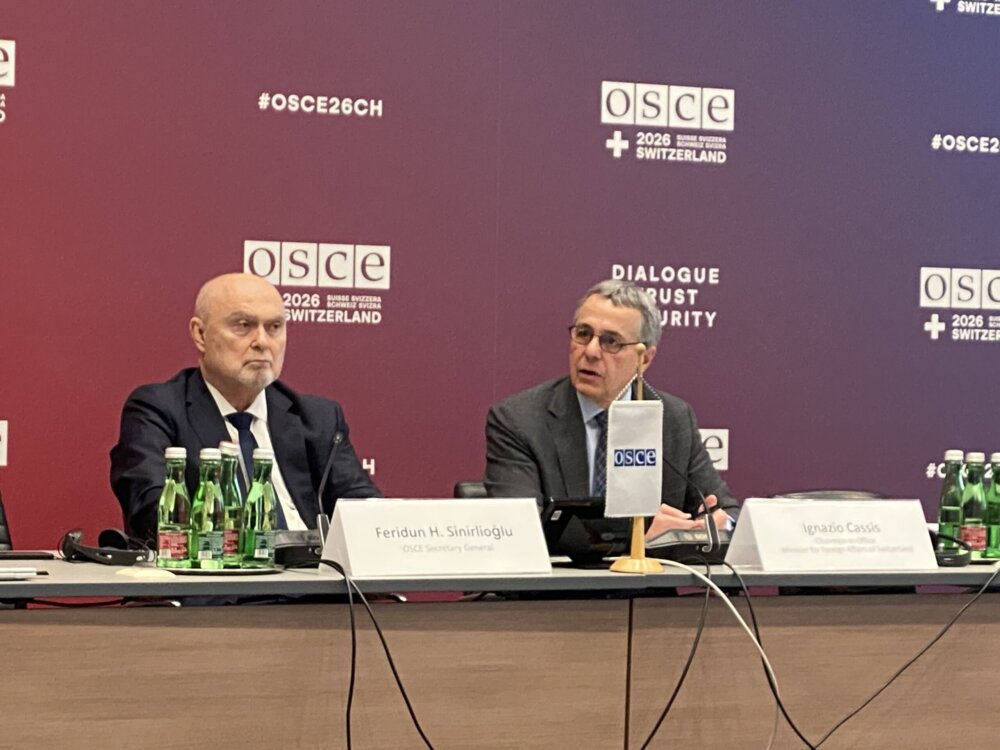OSCE/Mikhail Evstafiev

Maintain your Principles: how the in-coming Swiss Chair can rescue the legal order in the OSCE area
Switzerland, which will take on the Chair of the Organization for Security and Co-operation in Europe (OSCE) in 2026, approaches its tasks with understandable modesty. The turbulent world situation is such that keeping the organization functional and effective will be a huge task in itself, and doesn’t need to be burdened by a long list of priorities, as has been the habit of some past OSCE chairs.
Yet the top priority of the in-coming Swiss chairpersonship deserves special attention: to keep the international norms-based order alive in light of the huge challenges caused by great powers such as the Russian Federation, China, and the USA. Or, as the upcoming Swiss Chair formulated it, “Helsinki Principles – for lasting peace”. According to the incoming Chairpersonship, “Switzerland is committed to a just peace in Ukraine, based on international law and the Helsinki principles. It will bring its mediation experience to the service of dialogue, trust, and security.”
While this sounds like the mantra of any in-coming chair, under current conditions the importance of this first priority cannot be overestimated. It shows that Switzerland is fully aware of its enormous responsibility to do everything it can to use the OSCE as an organization to salvage the remnants of the seriously battered international legal system as well as the Decalogue of Principles of the Helsinki Final Act. Countries that don’t want to return to an archaic and anarchic world order where might equals right have a major responsibility and a self-interest to preserve and uphold a norms-based international order. The upcoming Swiss Chair has to be applauded for promoting this element as its first priority for the next year. This is also because the maintenance of a well-functioning norms-based international order is in the interest of all states which aim at promoting stability and peace in the world: without such order we will end up in total chaos.
However, this will be a daunting task considering that two great powers which are violating the OSCE’s most basic principles are in fact OSCE participating States. Russia’s brutal war of aggression against Ukraine is violating all OSCE principles and is also in direct violation of all major fundamental principles of international law, such as non-aggression, respect for sovereignty, territorial integrity, non-interference in internal affairs, and inviolability of borders. At the same time, the United States, under the Trump administration, is ignoring and violating many of its most important obligations under international law and the Helsinki Final Act as well, and is even threatening to use force against its closest allies (Canada, Denmark/Greenland, Panama) and other states such as Venezuela and Nigeria.
What Not to Do
Before exploring the options for implementing the first Swiss priority, it is worth reflecting on what should not be done. Although it is regularly suggested that the time has come to ‘update’ or ‘revise’ the 1975 OSCE Decalogue of Principles, the Swiss Chair should resist taking this path. Revising or updating the Decalogue would open a Pandora’s box, as it is absolutely clear that in the present climate, with a total lack of trust among the main states in the OSCE area, consensus about a revision of the commitments is an illusion. The only result of such efforts would be raising doubts about, or even undermining, the normative validity of the Decalogue. In the present climate of war and hostility, the only viable option is to continue hammering on the importance and binding force of the existing Decalogue, despite serious violations by several participating States. Otherwise, we would be thrown back on the only other legally binding basis of the international principles, i.e. the UN Charter. Without underestimating the Charter’s vital importance, also because it applies to all UN member states in the world and is the only authoritative basis for the global international legal order, its principles are of a more general and less elaborated nature in comparison with the OSCE commitments.
At the same time, it is obvious that times have changed substantially since the signing of the Helsinki Final Act in 1975. For example, hybrid warfare and the use of technology, including the massive use of digital means to launch offensives of hostile disinformation, have an impact on the interpretation and application of the principles. Disinformation campaigns by Russia and Belarus after the incursion of drones into Polish airspace in September 2025 are a good example. That said, although these new phenomena are important, they should not lead to the conclusion that the fundamental principles have become deficient. On the contrary, their applicability and importance are only enhanced.
How to proceed?
It is worth noting that Switzerland has made clear that it not only seeks to uphold international law and the Helsinki Principles, but it will also bring in its mediation experience. Although Switzerland’s position as a mediator has been compromised to some extent by Moscow’s accusation that the latter is no longer neutral since joining the sanctions against Russia, it is clear that the country still has a huge potential to offer in the area of mediation. This may become a valuable asset when the warring parties come closer to diplomatic talks. Besides, the OSCE offers an ideal platform for discussions on the applicability and effectiveness of the principles because of its comprehensive security approach: the wide range of security-related issues on the OSCE agenda allows for potential trade-offs in the debates, including several elements of the economic dimension.
The Swiss Chair could consider certain activities that aim at strengthening the role of the OSCE’s principles, for instance in the form of high level events. Such events should aim at discussing in greater detail the rather bleak state of affairs in this area and consider concrete measures to counter violations and strengthen the importance of international minimum standards. However, events like this should be structured in such a way that discussions about the most fundamental principles of international law do not have counter-productive effects. They should also not become just another forum for exchanging recriminations: the goal should be a forward-looking agenda. To this end, it could be prudent to hold such events in an informal setting. This could pave the way for some kind of formal reconfirmation of existing principles (such as happened for the last time in the 2010 OSCE Astana Declaration), which under current circumstances would be a major achievement.
The Swiss could also consider inviting the Netherlands to take a leading role in the promotion of the basic principles of international law and the OSCE Decalogue. As The Hague, with its prominent Peace Palace, promotes itself as the international city of peace and justice, the Netherlands would be the ideal partner to assist the OSCE Chair in the implementation of its highest priority in 2026. And the Peace Palace would be an ideal venue for the types of discussions suggested above.
Calling out violations
The Swiss Chair should continue emphasizing the international minimum standards against serious violations of human rights, international law and the Helsinki Principles. Protests against illegal activities by particular states testify to the continued relevance of the standards at stake. Although such protests would probably not stop norm-breaking behavior, they would send a signal to the violators, all other OSCE participating States, and the rest of the world that the minimum standards are still considered to be totally relevant and binding. By violating these standards, states should be made aware that there is a cost and that they will be subject to severe criticism not only by scholars and politicians, but by their peers as subjects of international law themselves.
Countries that break the rules need to pay a price. The ongoing sanctions by the EU, the US, and some other states on Russia are a clear example. Although the OSCE has no mandate to impose sanctions on its participating States, Switzerland should make it clear that it supports the various sanction regimes. This is a clear signal that it is not neutral when it comes to upholding the rule of law and OSCE principles and commitments.
When raising its voice against actions by one or more of the participating States, the Chair, of course, does not formally speak on behalf of the OSCE community at large, but mainly in its national capacity. This can have a political cost. However, the status of OSCE Chair can greatly enhance the political weight and visibility of such statements. In this context, Switzerland could also encourage participating States to make use of existing OSCE mechanisms, such as the Moscow or Berlin mechanisms, which do not require consensus, in order to highlight particularly serious violations of international law.
Since protesting and shaming will remain a key ‘weapon’ in the hands of OSCE states, efforts should also be continued to secure allies for this position in other parts of the world, for example among the OSCE’s Partners for Cooperation in the Mediterranean and Asia.
Mission impossible or a shared responsibility?
Although the implementation of Switzerland’s top priority to promote the OSCE principles will be a highly challenging task, there are options that the Chair could use to achieve its goals. Cooperation and goodwill of other participating States will be vital for bringing this agenda forward. As explained, the Netherlands appears particularly well-placed and qualified to play a key supporting role as well as Troika member Finland.
In 2026, Switzerland, as OSCE Chair, will have to perform a highly delicate balancing act which includes plenty of risks. But not standing up for OSCE principles would undermine the very foundations of the OSCE and European security. Switzerland has shown in the past, for example, as Chair in 2014, that it is able to accomplish seemingly impossible missions. The impending task certainly belongs in that category. But maintaining the OSCE principles should not be left to the Chair alone. It is the responsibility of all participating States. Therefore, all countries that seek to restore a just order in Europe should back Switzerland’s top priority.
Dr Arie Bloed is former editor-in-chief of Security and Human Rights and former professor of public international law at the Central European University and associate professor at Utrecht University.



Comments
* Your email address will not be published